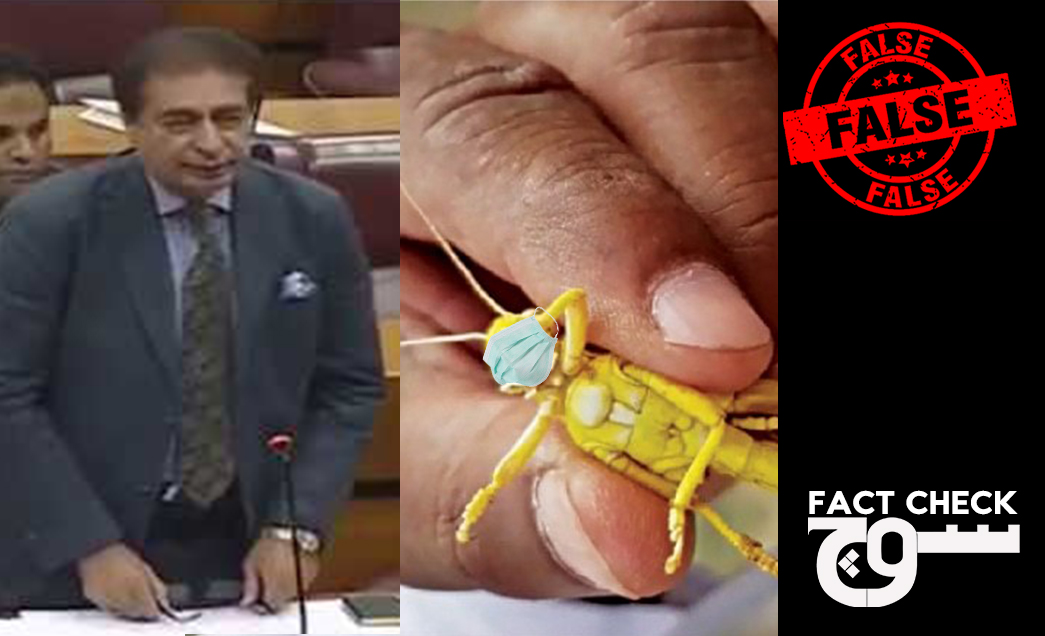
Claim: Eating locusts boosts the immune system’s response against Covid-19.
Fact: The immune system cannot be modified significantly by the consumption of any specific food, locusts or otherwise. Adhering to a healthy diet on the whole is the only way to provide ongoing support to the immune system.
On June 24 2020, Pakistan Tehreek-e-Insaf MNA Riaz Fatyana said the “common theory” that eating locusts results in increased immunity against Covid-19 should be investigated by the government. Soch Fact Check was unable to locate any references to the locusts-boosting-immunity theory online before it was shared by Fatyana in parliament.
Translation (00:55-01:20): Coming on to locusts, there is a common theory that if you eat locust it will provide the best defence against coronavirus. If you research this and it’s proven that eating locust can boost your immune system against coronavirus then the public will deal with the [locust] problem themselves. And the government will not have to do anything. The government should take this into consideration.
However, the research is already clear. Although locusts are high in protein, there is no evidence that any food in particular boosts immunity to the point where you are better protected against infection and disease, according to the Harvard Medical School.
These theories are based in misconceptions about how the immune system works. Instead of eating specific foods or supplements which claim to“boost” the immune system, the World Health Organization recommends consuming an overall healthy diet, exercising and avoiding stress to improve your chances of mounting a successful immune response against Covid-19. The immune system is incredibly complicated, made up of dozens of varieties of cells, tissues, organs, etc. which is why it’s impossible to simply induce a significant change in its ability to fight germs by adding one new food to your diet, no matter what that one new food is.
Dr. Kate Allen, Executive Director of Science and Public Affairs at the United Nations World Cancer Research Fund wrote in a press release dated 8 April 2020, ‘The complexity [of the immune system] means that it cannot be modified acutely by a specific nutritional intervention. Rather, adhering to a healthy diet provides ongoing support to the immune system and may even delay the process of immunosenescence (the natural gradual deterioration of the immune system as we get older)’.
On the other hand, eating away the locust swarm to protect crops is a much older suggestion that dates back to previous locust outbreaks, both in Pakistan and abroad. The United Nations Food and Agriculture Organization says, “Extensive research is in progress on biological control and other means of non-chemical control of locusts… Thus far control by natural predators and parasites is limited since locusts can quickly migrate away from most natural enemies… People and birds often eat locusts but usually not enough to significantly reduce population levels over large areas”.
It appears to us that Riaz Fatyana’s novel solution failed on both fronts. Eating locusts does not strengthen the immune system, and widespread consumption based on the belief that the insect boosts immunity will not significantly reduce their population.
More importantly, since the locust outbreak is currently managed around the world by using poisonous chemicals known as insecticides, locust consumption can be potentially harmful. If the locusts have been sprayed with insecticide, their ingestion can result in metabolic dysregulations, headaches, nausea, sleeplessness, diarrhoea, breathing problems and mental confusion. On the other hand, locust consumption is on the rise due to decreased food security after locust swarms have devastated food production.
Since spraying locusts with insecticide has been adopted in Pakistan recently, locals in affected areas may not be aware of the harms associated with consuming locusts that were previously safe to consume. It is important to emphasize the rising risks associated with consuming locusts that have been sprayed with insecticide, rather than advertising locusts as an immunity booster.
Summary: Eating locusts does not specifically boost immunity against Covid-19 or acutely strengthen the immune system. Locust swarms number in billions, and they usually cannot be consumed on a scale that makes a dent to their populations. Moreover, the adoption of insecticide to kill locusts makes their consumption very harmful. Locusts should not be consumed in regions where insecticide has been used.
Research Associate: Areeba Fatima
